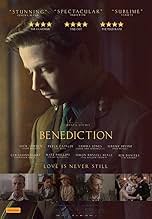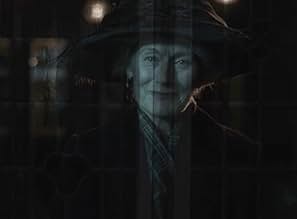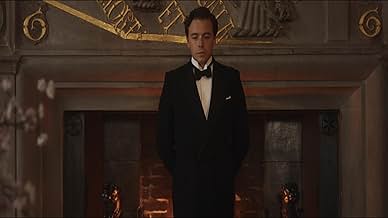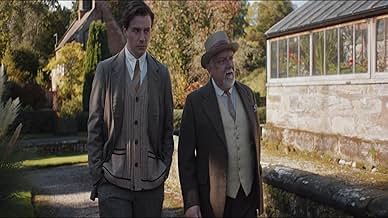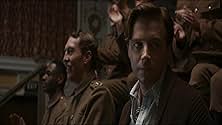NOTE IMDb
6,6/10
4,2 k
MA NOTE
L'histoire de la vie du poète, écrivain et soldat anglais Siegfried Sassoon.L'histoire de la vie du poète, écrivain et soldat anglais Siegfried Sassoon.L'histoire de la vie du poète, écrivain et soldat anglais Siegfried Sassoon.
- Réalisation
- Scénario
- Casting principal
- Récompenses
- 9 victoires et 19 nominations au total
Avis à la une
Davies is a masterful filmmaker. He has stated that he is not a "Gay" filmmaker in the way that, possibly, Jarman was. I think this is generally true. Davies seems more concerned with individual struggle and self-expression than homosexual rights. His period films recall a time when individuals created and asserted their identity in opposition to social conformity. While he emphasizes the personal and the private sphere of experience, he also recognizes how these can transform society. A Quiet Passion, Sunset Song, and Benediction are about people revolting in very unique ways. The performances and control of other elements are subtle, complex, and always interesting.
It's an anti-war biopic of the English poet Siegfried Sassoon that covers Sassoon's life from 1914 to the 1960s.
Siegfried Sassoon (Jack Lowden/Peter Capaldi) was a Second Lieutenant during World War I. His younger brother, Hamo (Thom Ashley), is killed during the war. Siegfried is further horrified by the tremendous human toll in death and lifelong disability caused by military leadership in which he no longer believes. Already a well-known poet, he refuses further participation in the war and is sent to the Craiglockhart War Hospital near Edinburgh technically for shell shock. There Siegfried meets and befriends Wilfred Owen (Matthew Tennyson), a much younger man. Siegfried also explicitly recognizes his own homosexuality.
The film then follows his anti-war sensibilities through snippets of his poetry and his chaotic love life, mainly focused on Ivor Novello (Jeremy Irvine) and Stephen Tennant (Calam Lynch/Anton Lesser). At a certain point, he tries to escape the chaos by marrying Hester Gatty (Kate Phillips/Gemma Jones). Together they have a son. George (Richard Goulding), but clearly, the marriage does not heal Sassoon's memories.
The film uses footage from the trenches in World War I and occasionally flips in time between the young Sassoon and the elderly Sassoon. Some of the editing decisions made little sense to me, particularly the early scene forecasting his conversion to Catholicism. Some edits made the film more complex than necessary. Nevertheless, the movie successfully portrays Sassoon as disabled because of World War I, from which he never psychologically recovered. This is clear from the multiple references to Wilfred Owens' poem, "Disabled."
Siegfried Sassoon (Jack Lowden/Peter Capaldi) was a Second Lieutenant during World War I. His younger brother, Hamo (Thom Ashley), is killed during the war. Siegfried is further horrified by the tremendous human toll in death and lifelong disability caused by military leadership in which he no longer believes. Already a well-known poet, he refuses further participation in the war and is sent to the Craiglockhart War Hospital near Edinburgh technically for shell shock. There Siegfried meets and befriends Wilfred Owen (Matthew Tennyson), a much younger man. Siegfried also explicitly recognizes his own homosexuality.
The film then follows his anti-war sensibilities through snippets of his poetry and his chaotic love life, mainly focused on Ivor Novello (Jeremy Irvine) and Stephen Tennant (Calam Lynch/Anton Lesser). At a certain point, he tries to escape the chaos by marrying Hester Gatty (Kate Phillips/Gemma Jones). Together they have a son. George (Richard Goulding), but clearly, the marriage does not heal Sassoon's memories.
The film uses footage from the trenches in World War I and occasionally flips in time between the young Sassoon and the elderly Sassoon. Some of the editing decisions made little sense to me, particularly the early scene forecasting his conversion to Catholicism. Some edits made the film more complex than necessary. Nevertheless, the movie successfully portrays Sassoon as disabled because of World War I, from which he never psychologically recovered. This is clear from the multiple references to Wilfred Owens' poem, "Disabled."
My initial reaction was, "unfocused and messy," but someone else called it a collage, and I think that is a more accurate description of the film.
It's not a biography, it's not really about war, or love, or living a closeted life during a specific period in UK history; it's not about aging; it's not about poetry, or trauma. The title suggests it might be about guidance, blessing, or redemption, but in regard to what, I can't really say.
It's also about all of those things, depending on the minute. The movie changes focus quite a few times, and I found that incredibly frustrating. After two and a half hours, I did not leave with any firmed-up impression of Sassoon, or the basic intention of the film.
Having said that, the lead actor and the rest are all perfectly enjoyable to watch, the dialogue is organic, and aside from spliced-in war footage, it is pleasing to the eye. It's a good choice for watching on demand or otherwise at home. But it's not a movie that lingers.
It's not a biography, it's not really about war, or love, or living a closeted life during a specific period in UK history; it's not about aging; it's not about poetry, or trauma. The title suggests it might be about guidance, blessing, or redemption, but in regard to what, I can't really say.
It's also about all of those things, depending on the minute. The movie changes focus quite a few times, and I found that incredibly frustrating. After two and a half hours, I did not leave with any firmed-up impression of Sassoon, or the basic intention of the film.
Having said that, the lead actor and the rest are all perfectly enjoyable to watch, the dialogue is organic, and aside from spliced-in war footage, it is pleasing to the eye. It's a good choice for watching on demand or otherwise at home. But it's not a movie that lingers.
Brownie points to Netflix for sponsoring this movie, which must have only limited appeal even to older gay viewers. Jack Lowden stars as World War One poet Siegfried Sassoon (Jack Lowden), whose emotional and sexual life director Terence Davies explores in this gloomy biopic. After publishing a letter condemning the military chiefs for the appalling death toll the conflict has brought, Sassoon is lucky not to be shot as a traitor; they send him to a mental institution where he meets and falls in love with fellow poet Wilfred Owen who's suffering from shell-shock (as PTSD was called in those dark days). Owen is sent back to die in Picardy in the last week of the war. The screenplay skates past Sassoon's brief return to active service.
After the war Siegfried has a brief affair with Ivor Novello (Jeremy Irvine), shown here as the uber-bitch in London's far-from-discreet gay set. Siegfried has a longer but equally unhappy affair with upper-crust socialite Stephen Tennant (Calam Lynch), the model for Sebastian Flyte in Evelyn Waugh's BRIDESHEAD REVISITED. Unhappy with homosexual life and converting to Catholicism, Sassoon marries. Flash-forward to his later life shows Sassoon (now played by Peter Capaldi) at odds with his wife and their son.
Throughout the movie Davies inserts horrific glimpses of battle casualties which never cease to haunt Sassoon. His poems are voice-overed from time to time, although two poems of Owen's make it clear that Sassoon was somewhat Second Division in comparison.
This is a beautifully shot movie, and all the cast perfectly evoke the look and feel of the 1920s and 30s, but the scriptwriter's prevailing tone is depressing. Male lovers and a wife all fail to bring happiness to Siegfried Sassoon. A life unfulfilled; a glum movie.
After the war Siegfried has a brief affair with Ivor Novello (Jeremy Irvine), shown here as the uber-bitch in London's far-from-discreet gay set. Siegfried has a longer but equally unhappy affair with upper-crust socialite Stephen Tennant (Calam Lynch), the model for Sebastian Flyte in Evelyn Waugh's BRIDESHEAD REVISITED. Unhappy with homosexual life and converting to Catholicism, Sassoon marries. Flash-forward to his later life shows Sassoon (now played by Peter Capaldi) at odds with his wife and their son.
Throughout the movie Davies inserts horrific glimpses of battle casualties which never cease to haunt Sassoon. His poems are voice-overed from time to time, although two poems of Owen's make it clear that Sassoon was somewhat Second Division in comparison.
This is a beautifully shot movie, and all the cast perfectly evoke the look and feel of the 1920s and 30s, but the scriptwriter's prevailing tone is depressing. Male lovers and a wife all fail to bring happiness to Siegfried Sassoon. A life unfulfilled; a glum movie.
Here's a lot of old fashioned Britishness we love. Repressed emotions hidden behind immaculate manner and only expressed through biting witty comments and classy bitching. But having partially lived in and experienced modern UK (or let's just say London, that is a world of its own) for over a decade now, it's the world that's almost gone... unless for such rare moments brought back by the dying breed as Terence Davies.
In that sense, the whole film is definitely sentimental, nostalgic... and gently bitter (as oppose to bitter sweet). Even the scenes of horror from WW1 are somewhat veiled with distinctively old fashioned verses of Siegfried Sassoon. For some reason most scenes with special effects (the scene where Siegfried dropping his medal being most noteworthy) feel so dated too, as in 90's film or a student project of SiFi.
My biggest issue in enjoying the film was that I gradually lost empathy with Siegfried. He starts off as gentle, smart young man, restrained but with lucid enough self-awareness and noble idealism of a youth. Then he dips in relationships with pretty but frivolous guys, predictably gets hurt by them, and then opts for a more conventional life of marriage and child in the selfish hope that the wife and son may give him the light he craves for. And then he ends up a bitter, distant, irritable and irritating old man, who vents out to his poor wife and suffering son, practically the only people left around, for their failure to become the light he wanted them to be.
Now, it's not entirely his fault alone. The horror of the war that scarred him for life and the intolerant society that kept him from acting upon his true love have a lot to answer for. Even his shallow, egoistic post-war lovers are largely because such bold 'crazy' ones were the only people who could live somewhat openly as gay in the repressive British society.
Nevertheless Siegfried had so many privileges - his uppercrust background, artistic talent, social recognition, and few but supportive friends. Despite of it all, he makes choices against his own truth and heart, and ends up a bitter resentful old man. His last ditch attempt to God wouldn't give him the solace he craves for.
I guess that is actually the message of the film - how giving up one's true heart and truth, whether by one's own will or circumstances, can leave one just a shell of oneself. And what's the worth of a poet when he can't speak his truth?
Overall it left me somewhat unsatisfied after 2 hours of run despite of its many enjoyable and charming virtues. I suspect Terence Davies himself has never quite overcome the pessimistic view he manifested in his early trilogy.
In that sense, the whole film is definitely sentimental, nostalgic... and gently bitter (as oppose to bitter sweet). Even the scenes of horror from WW1 are somewhat veiled with distinctively old fashioned verses of Siegfried Sassoon. For some reason most scenes with special effects (the scene where Siegfried dropping his medal being most noteworthy) feel so dated too, as in 90's film or a student project of SiFi.
My biggest issue in enjoying the film was that I gradually lost empathy with Siegfried. He starts off as gentle, smart young man, restrained but with lucid enough self-awareness and noble idealism of a youth. Then he dips in relationships with pretty but frivolous guys, predictably gets hurt by them, and then opts for a more conventional life of marriage and child in the selfish hope that the wife and son may give him the light he craves for. And then he ends up a bitter, distant, irritable and irritating old man, who vents out to his poor wife and suffering son, practically the only people left around, for their failure to become the light he wanted them to be.
Now, it's not entirely his fault alone. The horror of the war that scarred him for life and the intolerant society that kept him from acting upon his true love have a lot to answer for. Even his shallow, egoistic post-war lovers are largely because such bold 'crazy' ones were the only people who could live somewhat openly as gay in the repressive British society.
Nevertheless Siegfried had so many privileges - his uppercrust background, artistic talent, social recognition, and few but supportive friends. Despite of it all, he makes choices against his own truth and heart, and ends up a bitter resentful old man. His last ditch attempt to God wouldn't give him the solace he craves for.
I guess that is actually the message of the film - how giving up one's true heart and truth, whether by one's own will or circumstances, can leave one just a shell of oneself. And what's the worth of a poet when he can't speak his truth?
Overall it left me somewhat unsatisfied after 2 hours of run despite of its many enjoyable and charming virtues. I suspect Terence Davies himself has never quite overcome the pessimistic view he manifested in his early trilogy.
Le saviez-vous
- AnecdotesSeven of Siegfried Sassoon's poems were narrated in the film: Concert Interpretation, Died of Wounds, When I'm among a Blaze of Lights, To my Mother, To my Brother, Attack, and Invocation.
- GaffesSassoon did not discard his M.C. medal as shown in this film. He tossed away the medal's corresponding ribbon. The medal itself was inherited by Sassoon's son George.
- Citations
Dr. Rivers: Why not?
Siegfried Sassoon: Too afraid, too inhibited. Shamed by an inner corruption. Or perhaps it's simply because of... What's the phrase? "The love that dare not speak its name."
Dr. Rivers: You are not alone in that respect.
Meilleurs choix
Connectez-vous pour évaluer et suivre la liste de favoris afin de recevoir des recommandations personnalisées
- How long is Benediction?Alimenté par Alexa
Détails
- Date de sortie
- Pays d’origine
- Sites officiels
- Langues
- Aussi connu sous le nom de
- Benediction
- Lieux de tournage
- Chillington Hall, Port Lane, Brewood, Wolverhampton WV8 1RE, Royaume-Uni(Interiors and outdoor scenes)
- Sociétés de production
- Voir plus de crédits d'entreprise sur IMDbPro
Box-office
- Montant brut aux États-Unis et au Canada
- 201 093 $US
- Week-end de sortie aux États-Unis et au Canada
- 50 970 $US
- 5 juin 2022
- Montant brut mondial
- 847 418 $US
Contribuer à cette page
Suggérer une modification ou ajouter du contenu manquant

Lacune principale
What is the Hindi language plot outline for Les carnets de Siegfried (2021)?
Répondre



